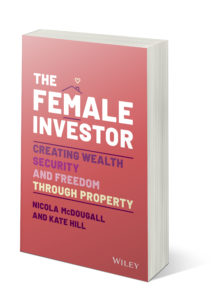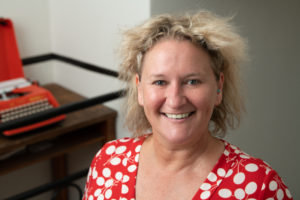
- Ms McDougall hopes The Female Investor will help create the first generation of financially free women
- Says she is motivated by the knowledge that financial outcomes are typically much worse for women, particularly in retirement
- Does not believe interest rates or property prices are cause for concern, urges investors to keep their eyes on the horizon
Journalist and fellow The Property Tribune contributor Nicola McDougall is taking the publishing world by storm with the release of The Female Investor, co-authored with Kate Hill.
In part 1, we spoke with Ms McDougall about spending her early years as a traveler and creative, before finding her feet in property investment, a journey that inspired the newly-released book.
Now, we explore how The Female Investor hopes to assist women of all ages to find their own financial freedom through property.
A dream to close the gender gap
Ms McDougall first pitched the idea for the female-targeted book in 2018, receiving interest from Wiley. Though as it often does, life got in the way and she found herself too busy to pursue the idea.
It was over mocktails and tapas inside Sydney’s Opera Bar that Nicola told a good friend, Kate Hill, of her idea to help other women realise their property dreams.
“I sort of mentioned the book and she said, ‘You should really do that. Women really need this information.'” said Ms McDougall, of the friendly catch-up that lead to the women deciding to collaborate on the book.
From there The Female Investor was born, which has since ranked highly in the accounting and finance charts on online bookstore Booktopia.

As for why empowering women to begin investing in property is so close to her heart, Ms McDougall says she is driven by the knowledge that financial outcomes for women are often inferior to men.
“More women than men end up in poverty in retirement.
“More women than men have to sell the family home and move to lower cost accommodation in retirement. More women than men have to actually go back into the workforce in retirement because they can’t financially survive,” she said.
Ms McDougall says however, that she doesn’t believe we are simply stuck in the dark ages when it comes to gender-based financial inequalities. Rather, these imbalances are a reflection of the fact that many women step away from the workforce to raise children, and find it difficult to close the gap after returning.
“This disparity between male and female super balanced balances actually begins when a woman’s in your 20s or late 20s, which was really quite surprising when I learned that research for the book, and it never recovers.”
According to a report by AustralianSuper, Australian women were found to retire with an average of 42% less super than a man.
That’s a figure Nicola hopes to see change, with a dream to help create the first generation of financially independent women.
The Female Investor contains information and advice for women of all ages and aims to help them get a foot on the property ladder, while acknowledging that everyone’s journey will be different.
“There’s no one size fits all model in property investment and that’s a very important point.
“Kate and I also said that if we could motivate or inspire one woman, one woman to do something, then writing the book would have been worth it,” she added.
Current climate not a cause for concern
As for whether we should be concerned by the influx of negative talk surrounding rising interest rates, Ms McDougall reminds buyers and investors that a minor adjustment of 2.5% is just that – minor.
“I think it’s important for existing borrowers and future borrowers to understand that interest rates and interest rate movements are a normal part of monetary policy.”
She added that very low interest rates are a sign of a weak economy, and a rise in interest rates signals a strengthening economy which is positive for us all.
Fluctuations in property prices should not be of any large concern either, with it being common for capital cities and regional centers to be doing different things at different times.
“it’s really about as an investor, or a home buyer, not being scared of temporary fluctuations in the property market and always just remembering that real estate is a long term investment.
“You really just need to keep your eye on the horizon,” Ms McDougall concluded.








